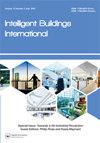Collaborative building control: a conceptual mixed-initiative framework
IF 1.7
Q2 CONSTRUCTION & BUILDING TECHNOLOGY
引用次数: 2
Abstract
ABSTRACT In the last two decades, automation systems have shown advanced developments and are widely adopted for various purposes in many fields. However, automation in buildings has not gained popularity and has a low acceptance level amongst the occupants. Decreased perceived control, ever-changing dynamic human needs, and standardized, one-size-fits-all approach in current automation systems lead to disharmony in human-machine coexistence. Although well-established continuous interaction between building control systems and occupants is acknowledged as one of the core elements of intelligent buildings, defined borderlines of the prevailing automation modalities fail to satisfy this primary feature. This research proposes a conceptual mixed-initiative building control framework enhancing collaboration and communication between building occupants and the automation. Through benefiting from both the control capacity of computer-powered methods and flexibility granted by incorporating occupants in the loop, demonstrated framework components may enact concurrent assessment of occupant comfort and energy efficiency while making automated applications more favorable for building inhabitants.协同建筑控制:一个概念混合倡议框架
摘要在过去的二十年里,自动化系统得到了长足的发展,并在许多领域被广泛用于各种目的。然而,建筑物中的自动化并没有得到普及,并且在居住者中的接受水平很低。当前自动化系统中感知控制的减少、不断变化的动态人类需求以及标准化、一刀切的方法导致了人机共存的不和谐。尽管建筑控制系统和居住者之间公认的持续互动是智能建筑的核心要素之一,但主流自动化模式的边界线无法满足这一主要特征。本研究提出了一个概念性的混合主动建筑控制框架,以增强建筑使用者和自动化之间的协作和沟通。通过受益于计算机驱动方法的控制能力和将居住者纳入回路所赋予的灵活性,所展示的框架组件可以同时评估居住者的舒适度和能源效率,同时使自动化应用程序更有利于建筑居民。
本文章由计算机程序翻译,如有差异,请以英文原文为准。
求助全文
约1分钟内获得全文
求助全文
来源期刊

Intelligent Buildings International
CONSTRUCTION & BUILDING TECHNOLOGY-
CiteScore
4.60
自引率
4.30%
发文量
8
 求助内容:
求助内容: 应助结果提醒方式:
应助结果提醒方式:


